Deck 1: Gametogenesis and Fertilization
Question
Question
Question
Question
Question
Question
Question
Question
Question
Question
Question
Question
Question
Question
Question
Question
Question
Question
Question
Question
Question
Question
Question
Question
Question
Question
Question
Question
Question
Question
Question
Question
Question
Question
Question
Question
Question
Question
Question
Question
Question
Question
Question
Question
Question
Question
Question
Question
Question
Question
Question
Question
Question
Question
Question
Question
Question
Question
Question
Question
Question
Question
Question
Question
Question
Question
Question
Question
Question
Question
Question
Question
Question
Question
Question
Question
Question
Question
Question
Question

Unlock Deck
Sign up to unlock the cards in this deck!
Unlock Deck
Unlock Deck
1/415
Play
Full screen (f)
Deck 1: Gametogenesis and Fertilization
1
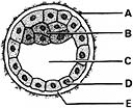 ________ Gives rise to part of the placenta
________ Gives rise to part of the placentaA) A
B) B
C) C
D) D
E) E
D
2
________ Contains enzymes that digest a path for the sperm
A) Polar body
B) Capacitation
C) Acrosome
D) Zona pellucida
E) Pronuclei
A) Polar body
B) Capacitation
C) Acrosome
D) Zona pellucida
E) Pronuclei
C
3
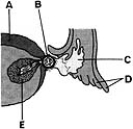 ________ Derived from a primary oocyte
________ Derived from a primary oocyteA) A
B) B
C) C
D) D
E) E
B
4
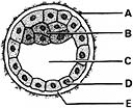 ________ Gives rise to the hypoblast
________ Gives rise to the hypoblastA) A
B) B
C) C
D) D
E) E

Unlock Deck
Unlock for access to all 415 flashcards in this deck.
Unlock Deck
k this deck
5
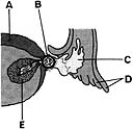 ________ Expelled with the follicular fluid
________ Expelled with the follicular fluidA) A
B) B
C) C
D) D
E) E

Unlock Deck
Unlock for access to all 415 flashcards in this deck.
Unlock Deck
k this deck
6
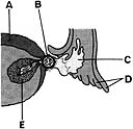 ________ Fimbriae
________ FimbriaeA) A
B) B
C) C
D) D
E) E

Unlock Deck
Unlock for access to all 415 flashcards in this deck.
Unlock Deck
k this deck
7
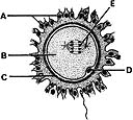 ________ Corona radiata
________ Corona radiataA) A
B) B
C) C
D) D
E) E

Unlock Deck
Unlock for access to all 415 flashcards in this deck.
Unlock Deck
k this deck
8
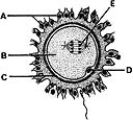 ________ Polar body
________ Polar bodyA) A
B) B
C) C
D) D
E) E

Unlock Deck
Unlock for access to all 415 flashcards in this deck.
Unlock Deck
k this deck
9
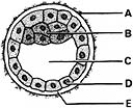 ________ Degenerates and disappears
________ Degenerates and disappearsA) A
B) B
C) C
D) D
E) E

Unlock Deck
Unlock for access to all 415 flashcards in this deck.
Unlock Deck
k this deck
10
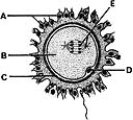 ________ Meiotic spindle
________ Meiotic spindleA) A
B) B
C) C
D) D
E) E

Unlock Deck
Unlock for access to all 415 flashcards in this deck.
Unlock Deck
k this deck
11
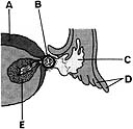 ________ Once filled the cavity of the ovarian follicle
________ Once filled the cavity of the ovarian follicleA) A
B) B
C) C
D) D
E) E

Unlock Deck
Unlock for access to all 415 flashcards in this deck.
Unlock Deck
k this deck
12
________ Haploid nuclei that fuse to form a zygote
A) Polar body
B) Capacitation
C) Acrosome
D) Zona pellucida
E) Pronuclei
A) Polar body
B) Capacitation
C) Acrosome
D) Zona pellucida
E) Pronuclei

Unlock Deck
Unlock for access to all 415 flashcards in this deck.
Unlock Deck
k this deck
13
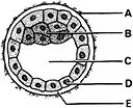 ________ Blastocystic cavity
________ Blastocystic cavityA) A
B) B
C) C
D) D
E) E

Unlock Deck
Unlock for access to all 415 flashcards in this deck.
Unlock Deck
k this deck
14
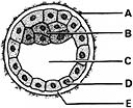 ________ Embryoblast
________ EmbryoblastA) A
B) B
C) C
D) D
E) E

Unlock Deck
Unlock for access to all 415 flashcards in this deck.
Unlock Deck
k this deck
15
________ Changes occur in it that inhibit entry of sperm
A) Polar body
B) Capacitation
C) Acrosome
D) Zona pellucida
E) Pronuclei
A) Polar body
B) Capacitation
C) Acrosome
D) Zona pellucida
E) Pronuclei

Unlock Deck
Unlock for access to all 415 flashcards in this deck.
Unlock Deck
k this deck
16
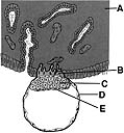 ________ Cytotrophoblast
________ CytotrophoblastA) A
B) B
C) C
D) D
E) E

Unlock Deck
Unlock for access to all 415 flashcards in this deck.
Unlock Deck
k this deck
17
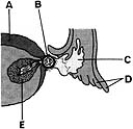 ________ Produces progesterone
________ Produces progesteroneA) A
B) B
C) C
D) D
E) E

Unlock Deck
Unlock for access to all 415 flashcards in this deck.
Unlock Deck
k this deck
18
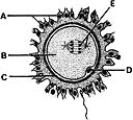 ________ Haploid cell
________ Haploid cellA) A
B) B
C) C
D) D
E) E

Unlock Deck
Unlock for access to all 415 flashcards in this deck.
Unlock Deck
k this deck
19
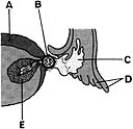 ________ Develops under luteinizing hormone influence
________ Develops under luteinizing hormone influenceA) A
B) B
C) C
D) D
E) E

Unlock Deck
Unlock for access to all 415 flashcards in this deck.
Unlock Deck
k this deck
20
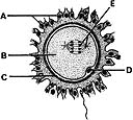 ________ Zona pellucida
________ Zona pellucidaA) A
B) B
C) C
D) D
E) E

Unlock Deck
Unlock for access to all 415 flashcards in this deck.
Unlock Deck
k this deck
21
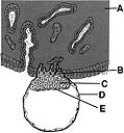 ________ Embryoblast
________ EmbryoblastA) A
B) B
C) C
D) D
E) E

Unlock Deck
Unlock for access to all 415 flashcards in this deck.
Unlock Deck
k this deck
22
________ Develops from a ruptured ovarian follicle
A) Corpus luteum
B) Zona pellucida
C) Prechordal plate
D) Ectopic implantation
E) Chorionic sac
A) Corpus luteum
B) Zona pellucida
C) Prechordal plate
D) Ectopic implantation
E) Chorionic sac

Unlock Deck
Unlock for access to all 415 flashcards in this deck.
Unlock Deck
k this deck
23
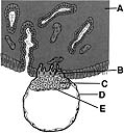 ________ Endometrium
________ EndometriumA) A
B) B
C) C
D) D
E) E

Unlock Deck
Unlock for access to all 415 flashcards in this deck.
Unlock Deck
k this deck
24
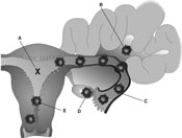 ________ Ovarian pregnancy
________ Ovarian pregnancyA) A
B) B
C) C
D) D
E) E

Unlock Deck
Unlock for access to all 415 flashcards in this deck.
Unlock Deck
k this deck
25
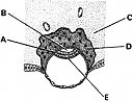 ________ Derived from cytotrophoblast
________ Derived from cytotrophoblastA) A
B) B
C) C
D) D
E) E

Unlock Deck
Unlock for access to all 415 flashcards in this deck.
Unlock Deck
k this deck
26
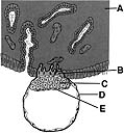 ________ Hypoblast
________ HypoblastA) A
B) B
C) C
D) D
E) E

Unlock Deck
Unlock for access to all 415 flashcards in this deck.
Unlock Deck
k this deck
27
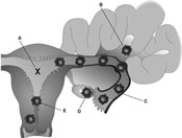 ________ Abdominal pregnancy
________ Abdominal pregnancyA) A
B) B
C) C
D) D
E) E

Unlock Deck
Unlock for access to all 415 flashcards in this deck.
Unlock Deck
k this deck
28
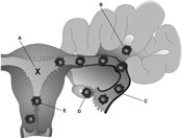 ________ Usual site of implantation
________ Usual site of implantationA) A
B) B
C) C
D) D
E) E

Unlock Deck
Unlock for access to all 415 flashcards in this deck.
Unlock Deck
k this deck
29
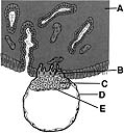 ________ Syncytiotrophoblast
________ SyncytiotrophoblastA) A
B) B
C) C
D) D
E) E

Unlock Deck
Unlock for access to all 415 flashcards in this deck.
Unlock Deck
k this deck
30
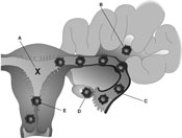 ________ Implantation at internal os
________ Implantation at internal osA) A
B) B
C) C
D) D
E) E

Unlock Deck
Unlock for access to all 415 flashcards in this deck.
Unlock Deck
k this deck
31
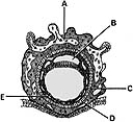 ________ Epiblast forms its floor
________ Epiblast forms its floorA) A
B) B
C) C
D) D
E) E

Unlock Deck
Unlock for access to all 415 flashcards in this deck.
Unlock Deck
k this deck
32
________ Surrounds embryo, amnion, and umbilical vesicle (yolk sac)
A) Corpus luteum
B) Zona pellucida
C) Prechordal plate
D) Ectopic implantation
E) Chorionic sac
A) Corpus luteum
B) Zona pellucida
C) Prechordal plate
D) Ectopic implantation
E) Chorionic sac

Unlock Deck
Unlock for access to all 415 flashcards in this deck.
Unlock Deck
k this deck
33
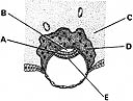 ________ Lies between the cytotrophoblast and the epiblast
________ Lies between the cytotrophoblast and the epiblastA) A
B) B
C) C
D) D
E) E

Unlock Deck
Unlock for access to all 415 flashcards in this deck.
Unlock Deck
k this deck
34
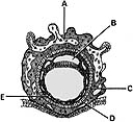 ________ Cytotrophoblast
________ CytotrophoblastA) A
B) B
C) C
D) D
E) E

Unlock Deck
Unlock for access to all 415 flashcards in this deck.
Unlock Deck
k this deck
35
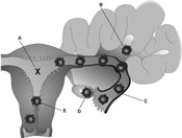 ________ Most common site of an ectopic pregnancy
________ Most common site of an ectopic pregnancyA) A
B) B
C) C
D) D
E) E

Unlock Deck
Unlock for access to all 415 flashcards in this deck.
Unlock Deck
k this deck
36
________ Develops as a localized thickening of hypoblast
A) Corpus luteum
B) Zona pellucida
C) Prechordal plate
D) Ectopic implantation
E) Chorionic sac
A) Corpus luteum
B) Zona pellucida
C) Prechordal plate
D) Ectopic implantation
E) Chorionic sac

Unlock Deck
Unlock for access to all 415 flashcards in this deck.
Unlock Deck
k this deck
37
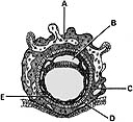 ________ Lacunar network
________ Lacunar networkA) A
B) B
C) C
D) D
E) E

Unlock Deck
Unlock for access to all 415 flashcards in this deck.
Unlock Deck
k this deck
38
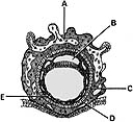 ________ Extraembryonic coelom
________ Extraembryonic coelomA) A
B) B
C) C
D) D
E) E

Unlock Deck
Unlock for access to all 415 flashcards in this deck.
Unlock Deck
k this deck
39
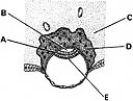 ________ Site of the decidual reaction
________ Site of the decidual reactionA) A
B) B
C) C
D) D
E) E

Unlock Deck
Unlock for access to all 415 flashcards in this deck.
Unlock Deck
k this deck
40
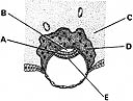 ________ Ventral layer of embryonic disc
________ Ventral layer of embryonic discA) A
B) B
C) C
D) D
E) E

Unlock Deck
Unlock for access to all 415 flashcards in this deck.
Unlock Deck
k this deck
41
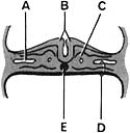 ________ Derived from paraxial mesoderm
________ Derived from paraxial mesodermA) A
B) B
C) C
D) D
E) E

Unlock Deck
Unlock for access to all 415 flashcards in this deck.
Unlock Deck
k this deck
42
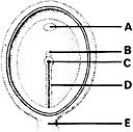 ________ Primitive pit
________ Primitive pit
Unlock Deck
Unlock for access to all 415 flashcards in this deck.
Unlock Deck
k this deck
43
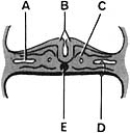 ________ Derived from notochordal process
________ Derived from notochordal processA) A
B) B
C) C
D) D
E) E

Unlock Deck
Unlock for access to all 415 flashcards in this deck.
Unlock Deck
k this deck
44
________ Appears on extraembryonic membranes
A) Allantois
B) Primitive streak
C) Notochord
D) Blood island
E) Neural plate
A) Allantois
B) Primitive streak
C) Notochord
D) Blood island
E) Neural plate

Unlock Deck
Unlock for access to all 415 flashcards in this deck.
Unlock Deck
k this deck
45
________ Gives rise to the brain and spinal cord
A) Allantois
B) Primitive streak
C) Notochord
D) Blood island
E) Neural plate
A) Allantois
B) Primitive streak
C) Notochord
D) Blood island
E) Neural plate

Unlock Deck
Unlock for access to all 415 flashcards in this deck.
Unlock Deck
k this deck
46
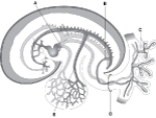 ________ Umbilical artery
________ Umbilical arteryA) A
B) B
C) C
D) D
E) E

Unlock Deck
Unlock for access to all 415 flashcards in this deck.
Unlock Deck
k this deck
47
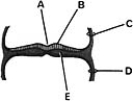 ________ Embryonic ectoderm
________ Embryonic ectodermA) A
B) B
C) C
D) D
E) E

Unlock Deck
Unlock for access to all 415 flashcards in this deck.
Unlock Deck
k this deck
48
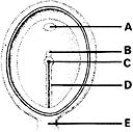 ________ Notochordal process
________ Notochordal processA) A
B) B
C) C
D) D
E) E

Unlock Deck
Unlock for access to all 415 flashcards in this deck.
Unlock Deck
k this deck
49
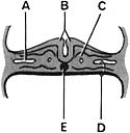 ________ Gives rise to an adult body cavity
________ Gives rise to an adult body cavityA) A
B) B
C) C
D) D
E) E

Unlock Deck
Unlock for access to all 415 flashcards in this deck.
Unlock Deck
k this deck
50
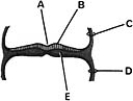 ________ Neural groove
________ Neural grooveA) A
B) B
C) C
D) D
E) E

Unlock Deck
Unlock for access to all 415 flashcards in this deck.
Unlock Deck
k this deck
51
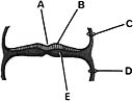 ________ Wall of amniotic sac
________ Wall of amniotic sacA) A
B) B
C) C
D) D
E) E

Unlock Deck
Unlock for access to all 415 flashcards in this deck.
Unlock Deck
k this deck
52
________ Source of mesenchyme
A) Allantois
B) Primitive streak
C) Notochord
D) Blood island
E) Neural plate
A) Allantois
B) Primitive streak
C) Notochord
D) Blood island
E) Neural plate

Unlock Deck
Unlock for access to all 415 flashcards in this deck.
Unlock Deck
k this deck
53
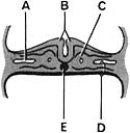 ________ Splanchnopleure
________ SplanchnopleureA) A
B) B
C) C
D) D
E) E

Unlock Deck
Unlock for access to all 415 flashcards in this deck.
Unlock Deck
k this deck
54
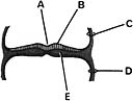 ________ Derived from primitive streak
________ Derived from primitive streakA) A
B) B
C) C
D) D
E) E

Unlock Deck
Unlock for access to all 415 flashcards in this deck.
Unlock Deck
k this deck
55
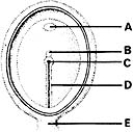 ________ Gives rise to most of the embryonic mesoderm
________ Gives rise to most of the embryonic mesodermA) A
B) B
C) C
D) D
E) E

Unlock Deck
Unlock for access to all 415 flashcards in this deck.
Unlock Deck
k this deck
56
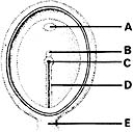 ________ Site of the prechordal plate
________ Site of the prechordal plateA) A
B) B
C) C
D) D
E) E

Unlock Deck
Unlock for access to all 415 flashcards in this deck.
Unlock Deck
k this deck
57
________ Forms the basis of the axial skeleton
A) Allantois
B) Primitive streak
C) Notochord
D) Blood island
E) Neural plate
A) Allantois
B) Primitive streak
C) Notochord
D) Blood island
E) Neural plate

Unlock Deck
Unlock for access to all 415 flashcards in this deck.
Unlock Deck
k this deck
58
________ Diverticulum of umbilical vesicle (yolk sac)
A) Allantois
B) Primitive streak
C) Notochord
D) Blood island
E) Neural plate
A) Allantois
B) Primitive streak
C) Notochord
D) Blood island
E) Neural plate

Unlock Deck
Unlock for access to all 415 flashcards in this deck.
Unlock Deck
k this deck
59
________ Aggregation of angioblasts
A) Allantois
B) Primitive streak
C) Notochord
D) Blood island
E) Neural plate
A) Allantois
B) Primitive streak
C) Notochord
D) Blood island
E) Neural plate

Unlock Deck
Unlock for access to all 415 flashcards in this deck.
Unlock Deck
k this deck
60
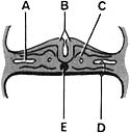 ________ Fusing to form neural tube
________ Fusing to form neural tubeA) A
B) B
C) C
D) D
E) E

Unlock Deck
Unlock for access to all 415 flashcards in this deck.
Unlock Deck
k this deck
61

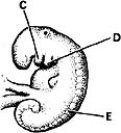 ________ Optic groove in neural fold
________ Optic groove in neural foldA) A
B) B
C) C
D) D
E) E

Unlock Deck
Unlock for access to all 415 flashcards in this deck.
Unlock Deck
k this deck
62

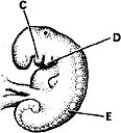 ________ Gives rise to the mandible
________ Gives rise to the mandibleA) A
B) B
C) C
D) D
E) E

Unlock Deck
Unlock for access to all 415 flashcards in this deck.
Unlock Deck
k this deck
63
________ Primordial mouth
A) Limb bud
B) Neuropore
C) Septum transversum
D) Cervical sinus
E) Stomodeum
A) Limb bud
B) Neuropore
C) Septum transversum
D) Cervical sinus
E) Stomodeum

Unlock Deck
Unlock for access to all 415 flashcards in this deck.
Unlock Deck
k this deck
64
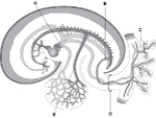 ________ Tertiary chorionic villus
________ Tertiary chorionic villusA) A
B) B
C) C
D) D
E) E

Unlock Deck
Unlock for access to all 415 flashcards in this deck.
Unlock Deck
k this deck
65
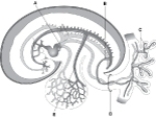 ________ Contains umbilical vessels
________ Contains umbilical vesselsA) A
B) B
C) C
D) D
E) E

Unlock Deck
Unlock for access to all 415 flashcards in this deck.
Unlock Deck
k this deck
66

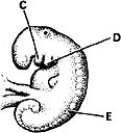 ________ Forms from the paraxial mesoderm
________ Forms from the paraxial mesodermA) A
B) B
C) C
D) D
E) E

Unlock Deck
Unlock for access to all 415 flashcards in this deck.
Unlock Deck
k this deck
67
________ Closes during the fourth week
A) Limb bud
B) Neuropore
C) Septum transversum
D) Cervical sinus
E) Stomodeum
A) Limb bud
B) Neuropore
C) Septum transversum
D) Cervical sinus
E) Stomodeum

Unlock Deck
Unlock for access to all 415 flashcards in this deck.
Unlock Deck
k this deck
68
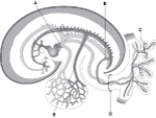 ________ Vitelline artery
________ Vitelline arteryA) A
B) B
C) C
D) D
E) E

Unlock Deck
Unlock for access to all 415 flashcards in this deck.
Unlock Deck
k this deck
69

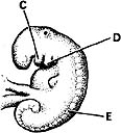 ________ Hyoid arch
________ Hyoid archA) A
B) B
C) C
D) D
E) E

Unlock Deck
Unlock for access to all 415 flashcards in this deck.
Unlock Deck
k this deck
70
________ Outgrowth of the ventrolateral body wall
A) Limb bud
B) Neuropore
C) Septum transversum
D) Cervical sinus
E) Stomodeum
A) Limb bud
B) Neuropore
C) Septum transversum
D) Cervical sinus
E) Stomodeum

Unlock Deck
Unlock for access to all 415 flashcards in this deck.
Unlock Deck
k this deck
71
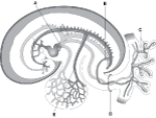 ________ Sinus venosus
________ Sinus venosusA) A
B) B
C) C
D) D
E) E

Unlock Deck
Unlock for access to all 415 flashcards in this deck.
Unlock Deck
k this deck
72
________ Forms the major part of the diaphragm
A) Limb bud
B) Neuropore
C) Septum transversum
D) Cervical sinus
E) Stomodeum
A) Limb bud
B) Neuropore
C) Septum transversum
D) Cervical sinus
E) Stomodeum

Unlock Deck
Unlock for access to all 415 flashcards in this deck.
Unlock Deck
k this deck
73
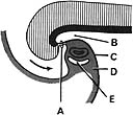 ______ Oropharyngeal membrane
______ Oropharyngeal membraneA) A
B) B
C) C
D) D
E) E

Unlock Deck
Unlock for access to all 415 flashcards in this deck.
Unlock Deck
k this deck
74
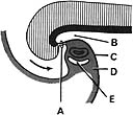 ______ Separates the amniotic cavity from the foregut
______ Separates the amniotic cavity from the foregutA) A
B) B
C) C
D) D
E) E

Unlock Deck
Unlock for access to all 415 flashcards in this deck.
Unlock Deck
k this deck
75
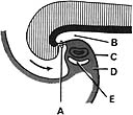 ______ Part of the embryonic coelom
______ Part of the embryonic coelomA) A
B) B
C) C
D) D
E) E

Unlock Deck
Unlock for access to all 415 flashcards in this deck.
Unlock Deck
k this deck
76

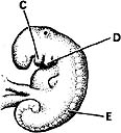 ________ Neuropore
________ NeuroporeA) A
B) B
C) C
D) D
E) E

Unlock Deck
Unlock for access to all 415 flashcards in this deck.
Unlock Deck
k this deck
77
________ Ectodermal depression in the neck
A) Limb bud
B) Neuropore
C) Septum transversum
D) Cervical sinus
E) Stomodeum
A) Limb bud
B) Neuropore
C) Septum transversum
D) Cervical sinus
E) Stomodeum

Unlock Deck
Unlock for access to all 415 flashcards in this deck.
Unlock Deck
k this deck
78
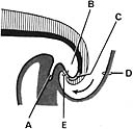 ______ Cloaca
______ CloacaA) A
B) B
C) C
D) D
E) E

Unlock Deck
Unlock for access to all 415 flashcards in this deck.
Unlock Deck
k this deck
79
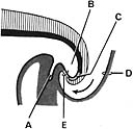 ______ Produces embryonic mesoderm
______ Produces embryonic mesodermA) A
B) B
C) C
D) D
E) E

Unlock Deck
Unlock for access to all 415 flashcards in this deck.
Unlock Deck
k this deck
80
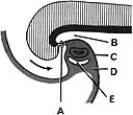 ______ Gives rise to a major part of the diaphragm
______ Gives rise to a major part of the diaphragmA) A
B) B
C) C
D) D
E) E

Unlock Deck
Unlock for access to all 415 flashcards in this deck.
Unlock Deck
k this deck



